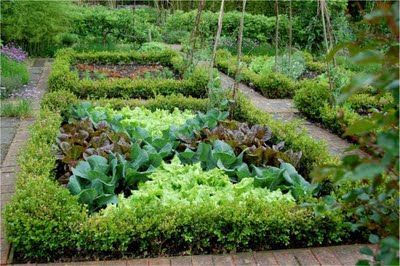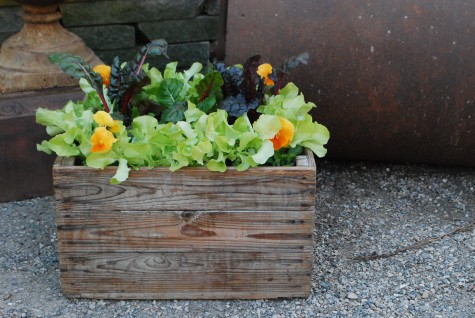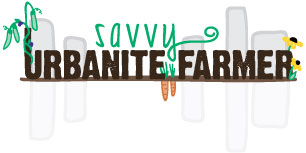Do you like salad? You’re a fool. Not because bacon is better (although, of course, it is) but because salad vegetables are nutrition-lite, resource-guzzling, pseudo-healthy food crimes that enable the overconsumption of blue cheese dressing.
— Emma Sturgess, The Guardian, Do you like salad? You’re a fool.

Large areas of lettuce in a garden inspired by French potager gardens by Seed to Feed Me.
Harsh words for a food we’ve been told is good for us. But is there a bit of wisdom behind this that we should explore? After all, we know that lettuce is a thirsty crop that demands about 15 gallons of water per pound of vegetable . Unfortunately, most of the commercially grown lettuce you find in the stores in the United States are from California, Arizona, and even Florida , while in England lettuce is produced year round in Spain . It would seem that this cooler weather food is being raised for our out of season consumption in very warm areas.
If the water issue in drought-prone, arid environments weren’t enough to deter your thoughts from the healthy to the possibly unhealthy side of the pendulum swing, then the idea of food-poisoning surely should. In Felicity Lawrence’s book Not on the Label, she goes under cover to test how healthy foods really are. A bag of salad greens has accounted for 6% of food-poisoning between 1992 and 2000, and in 1996 13% of the bagged veggies had E. coli.
But that was in the early 2000, and surely things have changed. Right?
Lawrence states in The Guardian that she was contacted more recently by someone who worked as a “quality controller” in the industry and had long experience of a large salad-washing factory.
It was as bad, if not worse, than I said, he told me. The leaves are washed in huge tanks of water that is only changed once a day and merely topped up in between. The mud and dirt builds up. At periods of peak demand, and with pressure on prices, the system gets close to breaking point. Chlorine added to the water to control pathogens was supposed to be computer-regulated, but sometimes they were having to add extra doses by hand.
We can only hope that things have changed between 2008 and now, but I have bad news for you. According to Professor Hugh Pennington, an emeritus professor of microbiology at the University of Aberdeen, there are certain types of bacteria found in pre-cut salad that could be almost impossible to kill. As you needed further persuading, there were E. coli breakouts as recently as 2013 in England as a result as poor cleaning techniques .
Isn’t that why we grow things on our own?

Lettuce planter from Dirt Sample by Deborah Silver.
OK, well, it’s not really the reason we grow our own things. We grow our own things partly because we are control freaks (guilty), but mostly because we enjoy good food and gardening. Salad falls into this category of being good food that is enjoyable to garden.
The fun part about salad greens is that there are so many different kinds of greens. There are warm weather loving spinach, cool weather loving lettuces. You can even find varieties that thrive in full sun and others that demand more shade. There are so many tastes and textures that they can make even the most stout flower gardener stop and stare in awe at the beauty.
Growing lettuce for a salad base isn’t difficult. In fact, growing any of the different lettuces are as easy as remembering to water them as often as they need — just like any other plant in your garden.
So, before you jump on the anti-salad bandwagon, grow some and share it with your neighbour. The leaves don’t have to be delicate, they just have to taste good. After all, no one is going to notice a random ragged edge after you add the delicious vegetables you’ve grown along side it. They will be far too busy eating and raving how good it tastes.
